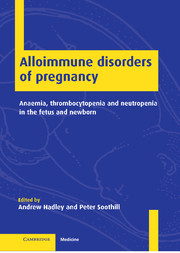 Alloimmune Disorders of Pregnancy
Alloimmune Disorders of Pregnancy Book contents
- Frontmatter
- Contents
- List of contributors
- Preface
- Foreword
- List of abbreviations
- 1 Pathophysiology of the alloimmune cytopenias
- 2 Blood group antibodies in haemolytic disease of the fetus and newborn
- 3 Basis and practice of screening for haemolytic disease of the fetus and newborn
- 4 Epidemiology and screening for alloimmune thrombocytopenia
- 5 Principles of antibody-mediated immune suppression and the prevention of maternal RhD alloimmunization
- 6 The clinical application of anti-D prophylaxis
- 7 Fetal genotyping
- 8 Laboratory assays to determine the severity of haemolytic disease of the fetus and newborn
- 9 Assessing the severity of haemolytic disease of the fetus and newborn: clinical aspects
- 10 Antenatal therapy for haemolytic disease of the fetus and newborn
- 11 Neonatal therapy for haemolytic disease of the newborn
- 12 The diagnosis of alloimmune thrombocytopenia
- 13 The immunological diagnosis of alloimmune neutropenia
- 14 Fetal and neonatal treatment of alloimmune thrombocytopenia
- Index
7 - Fetal genotyping
Published online by Cambridge University Press: 26 October 2009
- Frontmatter
- Contents
- List of contributors
- Preface
- Foreword
- List of abbreviations
- 1 Pathophysiology of the alloimmune cytopenias
- 2 Blood group antibodies in haemolytic disease of the fetus and newborn
- 3 Basis and practice of screening for haemolytic disease of the fetus and newborn
- 4 Epidemiology and screening for alloimmune thrombocytopenia
- 5 Principles of antibody-mediated immune suppression and the prevention of maternal RhD alloimmunization
- 6 The clinical application of anti-D prophylaxis
- 7 Fetal genotyping
- 8 Laboratory assays to determine the severity of haemolytic disease of the fetus and newborn
- 9 Assessing the severity of haemolytic disease of the fetus and newborn: clinical aspects
- 10 Antenatal therapy for haemolytic disease of the fetus and newborn
- 11 Neonatal therapy for haemolytic disease of the newborn
- 12 The diagnosis of alloimmune thrombocytopenia
- 13 The immunological diagnosis of alloimmune neutropenia
- 14 Fetal and neonatal treatment of alloimmune thrombocytopenia
- Index
Summary
Introduction
Determination of the genetic status of a fetus has been a major area for the application of molecular biology in modern medicine. Indeed, the use of the polymerase chain reaction (PCR) to amplify DNA was first reported in a paper describing the prenatal diagnosis of sickle cell disease. Four years later, this report was followed by the first description of an allele-specific PCR test, again for the prenatal diagnosis of sickle cell disease. Without doubt, the PCR has revolutionized contemporary molecular biology because, within a few hours, an individual's DNA can be analysed for the presence or absence of an allele, providing the sequence of the gene of interest is known. This chapter describes the principles of PCR, it recounts the development of PCR-based methods for the analysis of fetal blood groups and it reviews PCR-based assays which are currently used for the management of alloimmunized pregnancies. Prospects and constraints for fetal genotyping from maternal blood will then be considered.
The polymerase chain reaction
Principle of the polymerase chain reaction
The PCR involves the amplification of a specific DNA target using synthetic oligonucleotides that have sequences complementary to regions flanking the target sequence. Heating DNA (normally to 94 °C) causes its denaturation into two single strands. On cooling the mixture, the oligonucleotides (so-called ‘upstream’ and ‘downstream’ primers) bind to their target sites. Once bound, a DNA polymerase uses the primers to start the synthesis of a new DNA molecule.
- Type
- Chapter
- Information
- Alloimmune Disorders of PregnancyAnaemia, Thrombocytopenia and Neutropenia in the Fetus and Newborn, pp. 121 - 140Publisher: Cambridge University PressPrint publication year: 2001


